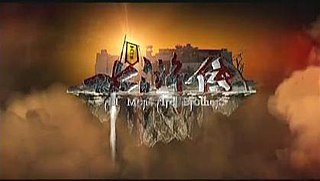
Wang Anshi, courtesy name Jiefu, was a Chinese economist, statesman, chancellor and poet of the Song Dynasty who attempted major and controversial socioeconomic reforms known as the New Policies. These reforms constituted the core concepts of the Song-Dynasty Reformists, in contrast to their rivals, the Conservatives, led by the Chancellor Sima Guang.

Alec Su You-peng is a Taiwanese actor, singer, television producer, and film director.

Huang Tingjian was a Chinese artist, scholar, government official, and poet of the Song dynasty. He is predominantly known as a calligrapher, and is also admired for his painting and poetry. He was one of the Four Masters of the Song Dynasty, and was a younger friend of Su Shi and influenced by his and his friends' practice of literati painting, calligraphy, and poetry.
Gao Qiu was a government official who lived during the Song dynasty of China and served in the court of Emperor Huizong. In the classical novel Water Margin, he is fictionalised as one of the primary antagonists and a nemesis of the protagonists, the 108 Stars of Destiny.

Abrosaurus is a genus of macronarian sauropod dinosaur from the Middle Jurassic Period of what is now Asia, one of many dinosaurs found at the Dashanpu Quarry in the Sichuan Province of China. Like most sauropods, Abrosaurus was a quadrupedal herbivore but it was rather small for a sauropod, not much more than 30 feet long. Its head was boxy and topped with a tall bony arch containing the nostrils.
The Dongpo Academy or Dongpo Shuyuan, was an academy located in Hainan, China. It was originally built in 1098 in memory of the Song dynasty literary figure, Su Dongpo, who was exiled here.

Chinese aristocrat cuisine traces its origin to the Ming and Qing dynasties when imperial officials stationed in Beijing brought their private chefs and such different varieties of culinary styles mixed and developed over time to form a unique breed of its own, and thus the Chinese aristocrat cuisine is often called private cuisine. The current Chinese aristocrat cuisine is a mixture of Shandong cuisine, Huaiyang cuisine and Cantonese cuisine. As Beijing was the capital of the last three Chinese dynasties, most of the Chinese aristocrat cuisine originated in Beijing. Currently, there are a total of nine varieties of Chinese aristocrat cuisine:

Dongpo pork is a Hangzhou dish which is made by pan-frying and then red cooking pork belly. The pork is cut thick, about 2 inches square, and should consist equally of fat and lean meat. The skin is left on. The mouthfeel is oily but not greasy and the dish is fragrant with wine. The dish is named after the famed Song Dynasty poet and gastronome Su Dongpo.

I Come with the Rain is a 2009 neo-noir atmospheric thriller written and directed by Vietnamese-born French director Tran Anh Hung, starring American actor Josh Hartnett.

All Men Are Brothers is a Chinese television series adapted from Shi Nai'an's Water Margin, one of the Four Great Classical Novels of Chinese literature. The series is directed by Kuk Kwok-leung and features cast members from mainland China, Taiwan and Hong Kong. The series was first broadcast on 8TV in March 2011 in Malaysia.
Song poetry refers to Classical Chinese poetry of or typical of the Song dynasty of China (960–1279). The dynasty was established by the Zhao family in China in 960 and lasted until 1279.
Su Park, also called Dongpo Park is located in the eastern of Changzhou, an area of 2.667 hectares. It is the typical garden of southern Changjiang delta combined of natural scenery and places of interest. In the Song Dynasty, people of Changzhou built ”boat outfitting, Pavilion” as a souvenir in order to commemorate the boating tour of the literary giant Su Dongpo here.
Changzhou Ancient Canal is a 44.2-kilometre canal in China, which runs in the southeast-northwest direction in Changzhou of Jiangsu Province, China.
The Old Museum of Wisteria is a small historical building and museum, where Su Dongpo is believed to have spent the final years of his life in Changzhou, China. It was originally known as the Sun pavilion. Records indicate that in the year 1172, the pavilion and a statue were built in memory of Su Dongpo. Originally constructed during the Ming Dynasty, much of the original pavilion remains. The lintel is carved in a design known as 'Fangsheng'—bars of stone are placed on it, each having four characters carved upon it: Teng, Hua, Jiu and Guan. The present name of the museum derives from Wisteria plantings which are said to have been planted, along with begonias, by Su Dongpo himself.
Bai Mudan, also romanized as Pai Mu-tan, is a character from Chinese mythology. She is described as the most beautiful courtesan in the city of Luoyang and a reincarnation of Peony fairy.

The Crow Terrace Poetry Trial was a trial on charges including treason and lèse majesté that occurred in the year 1079 of Song dynasty era in Chinese history. "Crow Terrace" refers to the nickname of the Imperial Office of the Censorate (御史臺), which prosecuted the case, citing Sung Criminal Code, Article 122: "Denouncing the Imperial Chariot". The most prominent figure of the dozens accused was the official and artist Su Shi, whose works of poetry were produced in court as evidence against him.

Kang Zhen is a Chinese scholar and a professor at the College of Arts, Beijing Normal University. He is best known for conducting lecture series about Chinese literature on the CCTV-10 television programme Lecture Room.











